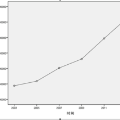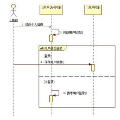Most of the metrics used for detecting a causal relationship among multiple time series ignore the effects of practical measurement impairments, such as finite sample effects, undersampling and measurement noise. It has been shown that these effects significantly impair the performance of the underlying causality test. In this paper, we consider the problem of sequentially detecting the causal relationship between two time series while accounting for these measurement impairments. In this context, we first formulate the problem of Granger causality detection as a binary hypothesis test using the norm of the estimates of the vector auto-regressive~(VAR) coefficients of the two time series as the test statistic. Following this, we investigate sequential estimation of these coefficients and formulate a sequential test for detecting the causal relationship between two time series. Finally via detailed simulations, we validate our derived results, and evaluate the performance of the proposed causality detectors.
翻译:大多数用于检测多个时间序列之间因果关系的指标忽略了实际测量障碍的影响,如有限样本效应、欠采样和测量噪声。已经表明,这些效应显著影响了基础因果性测试的性能。在本文中,我们考虑在考虑这些测量障碍的情况下,顺序检测两个时间序列之间因果关系的问题。在这种情况下,我们首先使用两个时间序列的向量自回归(VAR)系数的估计值的范数将格兰杰因果关系检测问题制定为二元假设检验。在此之后,我们调查了这些系数的顺序估计,并制定了用于检测两个时间序列之间因果关系的顺序检验。最后,通过详细的仿真,我们验证了我们推导的结果,并评估了所提供的因果检测器的性能。




